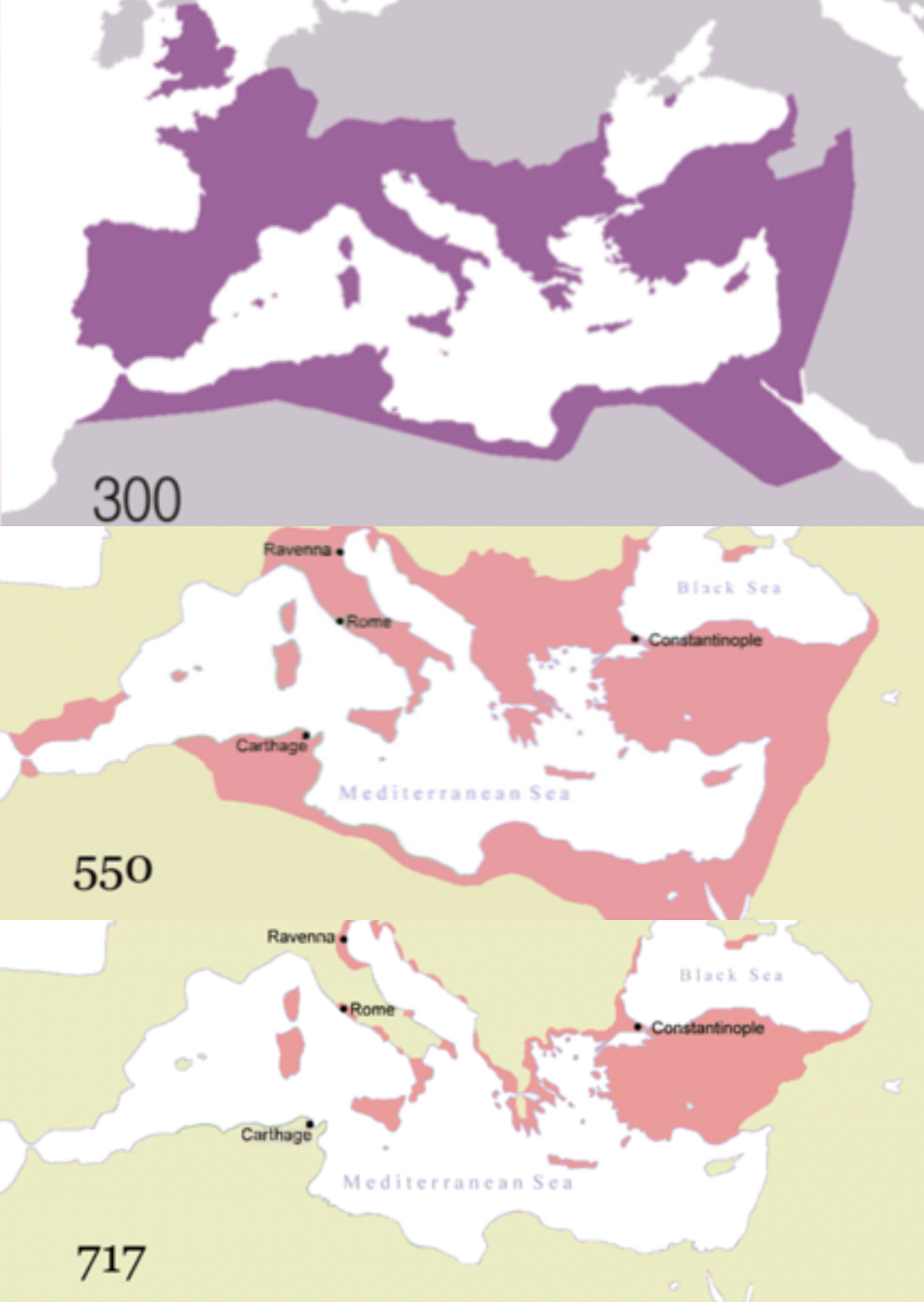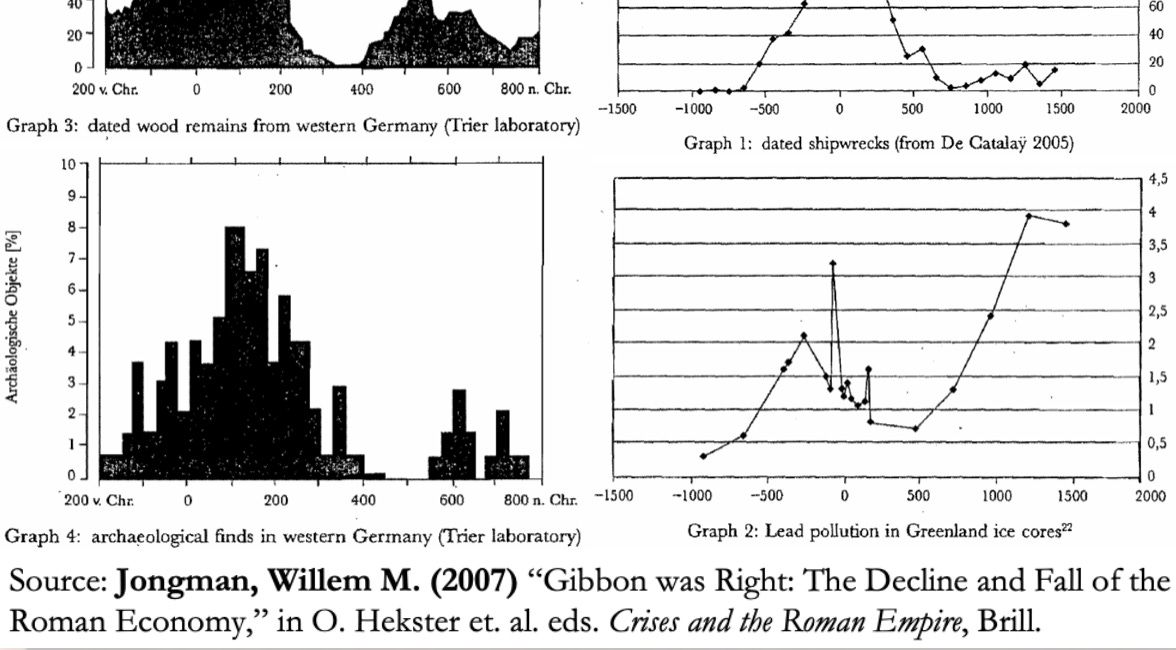Yes. Rome Did Fall
Call it a "Dark Age" from 400 or so to 900 or so in In Britannia, Germania, and Gallia—the provinces of Britannia Inferior, Britannia Superior, Germania Inferior, Germania Inferior, Belgica...
…Lugdenensis, Aquitaniam Narbonensis, and the Alpine provinces; and possibly also in Italia, Raetia, Noricum, Dalmatia, and Pannonia Superior and Inferior. Call it a “Late-Antiquity Pause” Eurasia-wide from 170 or so to 750 or so. But it makes exactly as much sense and is exactly as true for Gabrielle and Perry to say “Rome did not fall. It transformed” as it did make sense and was true for the Emperor Hirohito to say that while Japan had not lost WWII, “the war situation had developed not necessarily to Japan’s advantage.

Well! I have been sub-tweeted before, but I have never been sub-SubStacked!
Nor have I ever before been called an “EconoBro”.
But now I have been! And by two people who—well, they seem to me to be trying to make a career of being obtuse:
Matthew Gabriele & David M. Perry: You Gotta Do the Reading, Man: ’Let’s leave aside [Noah Smith’s… frankly, kind of racist… assumption that all [proper] civilizations should be defined by widespread literacy…. An economist [i.e., me; unnamed, uncited, and unlinked] with a big following on twitter and substack posted a “critique” of our conclusion that Rome didn’t fall….. Note here the definition of what makes a civilization (technological progress, but with no definition of what that means), and also where the “data” comes from. The numbers about population and income are “guesses.” The trend across FIFTY THOUSAND YEARS is extrapolation based on those guesses. Voila, “Dark Ages,” baby! This critic had at least done some of the reading but what his response reveals is that our argument and evidence (we don’t do “guesses”) didn’t fit his priors and so our argument had to be discarded. Econobros are triumphalist modernists, wedded to the inherent virtue of technological innovation, in part because their income depends upon it. Their models need to explain the world… perpetually being created ex nihilo, that cannot care for the past because that past can show alternatives…. You don’t like The Bright Ages? Fine. No worries. There are lots of other great books out there on medieval Europe. They all show not only how much we do know about the past but also how much we don’t know yet, how we can learn more and tell a better, more honest, more true story about the period. But as teachers, we both know when people didn’t do the reading. And man, you gotta do the reading…
What should I do with this strangely passive-aggressive screed—this denuniation of me, unnamed, uncited, and unlinked as I am?
Well, first, I can note that this is an “I am Spartacus” moment. Gabrielle and Perry call Noah Smith racist for daring to say that a civilization in which the working classes can read is in some powerful sense better than a civilization in which the working classes cannot? Then I think all who are not both malevolent and willfully obtuse should stand with Noah Smith here: We too believe that a civilization in which the working classes can read is in some powerful sense better than a civilization in which the working classes cannot. Gabrielle and Perry are calling all of us racist too.
And they should delete their accounts, and go away.
Well, second, I can drop an actual link to my piece on what annoyed me about The Bright Ages.
Þe Late-Antiquity Pause, & þe “Bright Ages!”
Become a free subscriber to receive this ‘Stack in your email. Do note that this Grasping Reality newsletter is a reader-supported publication—I really would like to collect enough from it to hire an…
What annoyed me about The Bright Ages? Most of all, it was these two sentences:
One premise: Rome did not fall. Things continue and things change…
Quite a stupid thing to say, no?
You can say what Gabrille and Perry do, just as the Emperor Hirohito could say at the end of World War II not that Japan had lost the war but that "the war situation has not necessarily developed to Japan’s advantage.
But what Hirohito said was false: Japan had lost the war.
And what Gabrielle and Perry say is false too: Rome did fall. Rome fell:
in 410 to the Visigoths,
in 455 to the Vandals, and i
in 493 to the Ostrogoths.
After 450 there was no real thing called the Roman Empire in what had been its western provinces. Rome had fallen, and the emperors with their armies and bureaucracies had withdrawn from the west and moved to Constantinople. There was after 450 nlo Roman tax-collecting bureaucracy in what had been the western provinces of the Roman Empire to maintain the state, no administrative bureaucracy in what had been the western provinces of the Roman Empire to try to make decrees of Roman governors facts on the ground at other than sword’s point, and no army large enough to keep any barbarian tribe from going wherever it wanted whenever it wanted.
After 476, there was nobody even claiming to be Roman Emperor in Italy—not even in the swamp-protected Adriatic coastal fortress of Ravenna, to which Honorius had fled from the Visigoths in 402.
Yes, the Eastern Roman Empire headquartered in Constantinople held on and was indeed transformed into the Byzantine Empire.
Yes, its army and administrative bureaucracy and tax-collecting bureaucracy held on.
Yes, Constantinople itself was not conquered until it was betrayed to Frankish crusaders in 1204.
Yes, afterwards Constantinople was again the capital of a rump state calling itself βασιλεία Ῥωμαίων—Basileia Rhōmaiōn—from 1261 to 1453.
Yes, even afterwards the name “Cæsar” was still one to conjure with politically, for the last person to call himself “Cæsar” only laid aside his crown in 1948.
But the city of Rome itself was never a capital after 476, and was only garrisoned by Byzantine soldiers from 536 to 774.
To claim “Rome did not fall” is to falsify history. Yet Gabrielle and Perry claim that all that happened was “transformation”:
Cities never vanish but they do shrink, both in population and in importance, as people find new ways to organize political, economic, and cultural life in seeking stability. That stability comes with innovative ways of thinking about God… sparking a fire that will nourish a blossoming of intellectual and literary life…. But then circles turn again…. Connections between regions that were never severed did stretch and attenuate… creating the conditions for a medieval Italian poet to follow in the footsteps of a late Roman empress. Welcome to The Bright Ages…
To make such a claim is to lead your readers to believe false things, and to profoundly understand the history that Gabrielle and Perry claim to want to cover.
For one thing, you cannot understand the context of Augustine’s great City of God while denying the importance of the fall of Rome. If Rome was not falling, why then did Augustine write this?:
All… Rome was exposed to in the recent calamity… slaughter, plundering, burning, and misery… was… the custom of war. But what was novel was that savage barbarians showed themselves… so gentle a guise, that [from] the largest churches… filled with the people… in them none were slain, from them none forcibly dragged… from them none were led into slavery by merciless foes. Whoever does not see that this is to be attributed to the name of Christ, and to the Christian temper, is blind; whoever sees this, and gives no praise, is ungrateful; whoever hinders any one from praising it, is mad…. The barbarians[’]… fierce and bloody minds were awed, and bridled, and marvellously tempered by Him who so long before said by His prophet, “I will visit their transgression with the rod, and their iniquities with stripes; nevertheless my loving-kindness will I not utterly take from them”…
Augustine’s entire point here—indeed, one major point of his entire book—is that the City and Power of Rome can no longer protect anyone, but that the City of God and the Power of Christ can and do protect all Believers, sometimes on this earth, and always in the afterlife.
Why Augustine feels so impelled to write this so urgently in the years 413–426 is something that Gabrielle and Perry’s “Rome did not fall” rhetorical chance hides from their readers.
Better to say true things than false things.
Much better not to claim that people who think literacy is an important and positive thing are racists.




I believe a case can be made that the Gothic successors to the emperors, and the people living under their rule, didn’t experience the “Fall of Rome” as a “thing,” mostly because it happened gradually over many decades. Theodoric was kind of a Gothic Western Roman Emperor. The laws and traditions were all still Roman, with pointy Gothic edges. There’s a sense in which, by trying to “restore” the empire, Justinian delivered the ultimate fatal blow to the West, reducing what was left of Rome to ruins. I certainly agree, as does archeology, that what we think of as the fall of the Western Empire was accompanied by a steep and persistent decline in every aspect of the quality of life for most people. The Dark Ages is the right name for it.
This episode has certainly revised my opinion of Gabrielle and Perry. I had hitherto read them as good-natured historians consciously adopting a hyperbolic position to attract attention to their history and deflate a few popular myths along the way. Now it seems to have adopted them.
"Rules for contrarians: don't whine!"